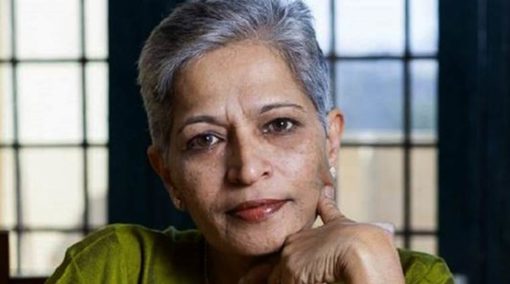
The Karnataka Special Investigation Team (SIT) will reportedly start framing charges against the 16 accused in the murder case of Gauri Lankesh at the special Karnataka Control of Organised Crime Act (KCOCA) court in Bengaluru. The lawyers representing the accused had applied for bail for all the 16 saying, “ the chargesheet in the case was not filed within the stipulated 180 days and also that most of the accused did not have any criminal antecedents and hence could not booked under the stringent provisions of KCOCA,” reported Bangalore Mirror. The court, however, has rejected the bail application.
According to the report in Bangalore Mirror, “Special Public Prosecutor S Balan said that there was no delay as the chargesheet was filed on the 175th day, and also that under KCOCA the 180-day deadline is not applicable in filing of chargesheet. The prosecution also told the court that multiple accused of the murder were booked in similar cases were executed by them operating as an organised syndicate.”
According to the Karnataka Control of Organized Crimes Act, 2000, “Organised crime syndicate”, means a group of two or more persons who acting either singly or collectively, as a syndicate or gang, indulge in activities of organised crime.
“Organised crime” means any continuing unlawful activity by an individual, singly or jointly, either as a member of an organized crime syndicate or on behalf of such syndicate, by use of violence or threat of violence or intimidation or coercion, or other unlawful means, with the objective of gaining pecuniary benefits, or gaining undue economic or other advantage for himself or any other person or promoting insurgency.”
The SIT, in August, had invoked Section 3 of KCOCA, which attracts death penalty and life imprisonment. The Section 3 of this Act says, “In a prosecution for an offence of organized crime punishable under section 3, if it is proved, that unlawful arms and other material including documents or papers were recovered from possession of the accused and there is reason to believe that such unlawful arms and other material including documents or papers were used in the commission of such offence; or That the evidence of an expert, the fingerprints of the accused were found at the site of the offence or on anything including unlawful arms and other material including documents or papers and vehicle used in connection with the commission of such offence, the Special Court shall presume, unless the contrary is proved, that the accused had committed such offence.”
The investigations into the assassination of rationalist and anti-Hindutva voices — Narendra Dabholkar, Govind Pansare, M M Kalburgi and Gauri Lankesh — have produced clear evidence in the form of diaries, documents, gun forensics, and statements of participants, that a five-state network of like-minded hardcore Hindutva supporters exists, and has been actively planning the physical elimination of these and many other opponents of their regressive, medieval ideology. The shadowy leaders of at least two known Hindu extremist groups, the Sanatan Sanstha (SS) and its splinter Hindu Janajagruti Samiti (HJS) were the fulcrum of this terror group.
Parashuram Waghmare, associated with the Sri Ram Sene, who was arrested by the Karnataka SIT had confessed to have assassinated Gauri Lankesh to “save Hindutva”. The investigation had also revealed the existence of a certain terrorist organisation of the hardline Hindutva recruits functioning in five states: Madhya Pradesh, Gujarat, Maharashtra, Goa and Karnataka. The SIT had noted that this unnamed organisation was a machinery functioning behind these planned killings of anti-Hindutva voices.
During the course of its investigation, the SIT has recovered two lists containing names of 34 targeted individuals who had publicly condemned Hindutva politics. The list recovered from Amol Kale had eight names. Girish Karnad, a well-known playwright and activist from Karnataka was the first name, followed by Gauri Lankesh. The second list had 26 other names. KS Bhagwan, BT Lalita Naik, Veerabhadra Channa Mallikarjuna Swamy of Nidumamidi Mutt, C S Dwarakanath, Yogesh Master, Chandrashekhar Patil, Banjagere Jayaprakash, Patil Puttappa, Nataraj Huliyar, Baraguru Ramachandrappa, Chennaveera Kanavi, Narendra Nayak, and S M Jamadar, are some of the literary figures and activists whose names are in these two lists. Megha Pansare, the daughter-in-law of late Govind Pansare has been provided security in the light of threats to her life.




